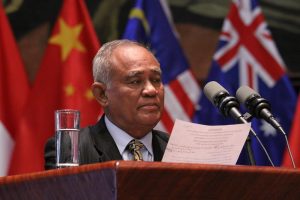A senior leader from the banned Cambodia National Rescue Party (CNRP) has defected to a newly formed opposition party after the country’s King Norodom Sihamoni granted his request for “political rehabilitation” yesterday.
According to a report by Radio Free Asia (RFA), Pol Ham, one of the party’s three deputy presidents, will join the Cambodian Reform Party, which was formed earlier this year by the former CNRP official Ou Chanrath.
After coming close to toppling Prime Minister Hun Sen’s long-ruling Cambodian People’s Party (CPP) at elections in July 2013, the CNRP was dissolved by a court order in November 2017, on the grounds that it had colluded with foreign powers to launch a “color revolution” to overthrow the CPP administration.
This came two months after the party’s president, Kem Sokha, was arrested on similar accusations and charged with treason. Liberated from any meaningful source of opposition, the CPP went on to win all 125 parliamentary seats at national election in July 2018, ushering in a period of de facto one-party rule in Cambodia.
“I have not done anything for the past three years and six months so I think now it is time to have the political ban lifted,” Pol Ham told RFA, explaining that he hoped to participate in commune-level elections next year and national polls in 2023. “We can’t get the CNRP back, but there is no law that prevents us from using the same CNRP spirit, so that we comply with the law,” he added. “We can’t be too extreme.”
When a Cambodian court dissolved the CNRP in 2017, it also banned 118 prominent party officials from politics for five years. A year later, the CPP-controlled Constitutional Council approved an amendment to the country’s law on political parties, opening up a pathway for the return to politics for the 118 blacklisted opposition officials, on the proviso that they make a personal request to Hun Sen.
The price for this “rehabilitation,” of course, is to tacitly accept the CPP’s unfounded claim that the CNRP was plotting a “color revolution,” and abandon any open allegiance to the banned party. So far, 25 of the 118 banned CNRP officials have requested rehabilitation and founded three new opposition parties. A number of local CNRP officials have also defected to the CPP or other opposition parties, though many continue to hold out in the face of government pressure.
The CPP’s ultimate purpose is to fracture the opposition and forestall the emergence of a unified opposition, such as that which nearly threatened the CPP at the 2013 national election. At that election, the CNRP, formed a year earlier by a merger between the Sam Rainsy Party and Kem Sokha’s Human Rights Party, enjoyed a surge of support, slashing the CPP’s parliamentary majority from 90 seats to just 68.
Pol Ham’s “rehabilitation” comes after a report that Kem Sokha, who has been released from custody but remains under court supervision, is working to convince the CPP to negotiate a political pact to the country’s prolonged political stalemate. Suon So Rida, a former CNRP lawmaker and Kem Sokha loyalist, told RFA last week that Sokha hoped to involve foreign governments, including some of the signatories of the 1991 Paris Peace Agreements, which introduced Cambodia’s democratic system.
With elections on the horizon, history suggests that some sort of negotiated political arrangement between Hun Sen and Kem Sokha is likely – but none that involves the genuine empowerment of the Cambodian opposition, or the resurrection of the old CNRP. The “rehabilitation” of CNRP officials offers Hun Sen’s preferred template: national “reconciliation” on the basis of his own party’s unquestioned dominance.
An earlier version of this article described Pol Ham as the CNRP’s deputy president. In fact, the party has three deputy presidents.

































